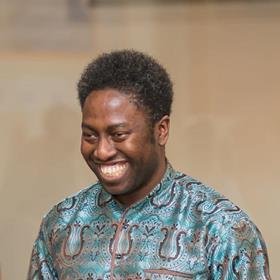After reports of a fresh outpouring at Asbury University, Emma Fowle speaks to three leaders to discuss what God might be doing
Why aren’t people falling over in church any more? If you lived through the Charismatic Renewal movement of the 1980s and 90s, then your relatively normal experience of a Sunday morning church service may have included the following: people being ‘slain in the Spirit’ – falling over after having been prayed for (or gently sliding off their chairs), lying on the floor for protracted periods of time, shaking, laughing loudly or weeping; miraculous healings, speaking in tongues, manifestations and demonic deliverance.

Perhaps you saw (or heard rumours of) gold teeth suddenly appearing, flakes of gold floating down from the sky, or oil appearing on hands. Maybe you or someone you know travelled to Canada to experience the ‘Toronto Blessing’ or visited Holy Trinity Brompton (HTB) in the early days after Eleanor Mumford prayed for the leadership team and famously left them immobilised, seemingly ‘drunk in the Spirit’. She returned the following Sunday to see the whole undignified thing repeated among the wider congregation of upper middle-class Kensington Anglicans.
By the end of 1994, estimates suggest that between 2,000 and 4,000 churches across the British Isles had embraced this new wave of God’s Spirit. Throughout the following three years, it remained one of the biggest news stories to come out of the Church, garnering mainstream media coverage. But nearly 30 years later, what has happened to the Charismatic Renewal movement? And why don’t we see such an abundance of physical manifestations of God in our everyday church meetings anymore?
Since reports began reaching our shores a few months ago, of a fresh outpouring of God’s Spirit at Asbury University, Kentucky, hopes have been rekindled of a new move of God here, too. Indeed, some have been praying for and prophesying a fresh awakening in the UK for some time. As the Church prepares to mark Pentecost this month, we sat down with three church leaders to discuss.
Rev Pete Hughes (left)
Pete and his wife, Bea, run Kings Cross Church (KXC) in London, an Anglican church that is part of the HTB network. He has recently returned from visiting Asbury University, Kentucky.
Emma Stark (centre)
Emma and her husband, David, are the co-founders and co-directors of the Global Prophetic Alliance and Glasgow Prophetic Centre. Emma is also a leader of the British Isles Council of Prophets.
Rev Dr RT Kendall (right)
Theologian, author and speaker, RT was senior minister of Westminster Chapel, London, from 1977 to 2002 and a key figure in the Charismatic Renewal movement in the UK.
__________________________
Pete Hughes (PH): My dad was a vicar and a key leader in the New Wine movement, which was hugely affected by the Charismatic Renewal and Toronto Blessing.
At New Wine ’89, which was the very beginning of the New Wine story, I was ten years old. In my teenage years, it was normal for me to see prophetic gifts, healing and miracles. I remember walking through New Wine and seeing a sea of bodies, slain in the Spirit, shaking or manifesting. When that becomes normal, it’s hard to shake. I know what a move of the Spirit looks like, and anything less than that, there’s going to be dissatisfaction. So I’ve been in this wrestling: “Lord, I want to be caught up in a fresh move of the Spirit where people encounter you in power.” That’s where my hunger comes from.
I think we’re on the brink of some really exciting days for the Church
Emma Stark (ES): My background is very conservative and traditional. My father is an Irish Baptist minister, so we were very much Father, Son and Holy Scriptures. In the early 90s, as a student at York University, I was at St Michael le Belfry Church when in walked John Wimber. The man was prophesying and there were bodies, like you say, everywhere. I’m like: What is this? Is it biblical? Do I like it?
But I would totally agree. It marks you with this ferocious appetite for more of God, to the point where you’re like: “Whatever it takes, whatever it costs, however uncomfortable it is, I will not be satisfied until I see God’s glory rest on us again!”
EF: So would you agree that what was happening in the UK Church in the 80s and 90s came to an end? And if so, why was that?
PH: I think the Spirit is still moving, but are we seeing the same level of signs and wonders? I’m not sure we are. When you’re not seeing lots of the activity of the kingdom, it’s possible to settle where you are and build a theology that justifies that experience. It’s like camping out in the wilderness rather than pressing on to the promised land.
The alternative is to allow the dissatisfaction to grow; to knock on the door of heaven until the doors open and the spring rains start falling. I’d far rather be in the latter camp than choosing to settle in the wilderness.
‘Christians in Britain prayed for many years for revival, and when it came they did not recognise it because it was Black’

The 1904 Welsh revival, led by Evan Roberts, was the catalyst for the Pentecostal movement in Britain, laying the foundation for denominations such as Elim, Assemblies of God and the Apostolic Church of Great Britain (ACGB). Alexander Boddy, considered the father of Pentecostalism in Britain, visited Roberts and his church in Sunderland later became a meeting point for people wanting to receive baptism in the Holy Spirit. One of those who experienced this was Rev Thomas Kwame Brem-Wilson, a businessman and schoolmaster born in Ghana. He came to Britain in 1901, and in 1906, started Sumner Road Chapel in Peckham, London.
After attending the Sunderland revival meetings, Brem-Wilson developed relationships with the founders of the ACGB and hosted a conference with them in London in 1923. At that time, interracial relationships were rare, and this reveals the significant role that the Pentecostal movement played in breaking down racial barriers and church traditions.
However, due to racism this dynamic, intercultural movement did not continue through the Charismatic Renewal that started in the 1960s; neither did it endure through later developments that saw the emergence of the New Church movement or Apostolic networks of the 80s and 90s.
Reflecting on the experiences of the African-Caribbean Christians who came to the UK during the Windrush generation and were often not welcomed by British society or the Church, Walter Hollenweger, popularly referred to as the doyen of Pentecostalism, said: “Christians in Britain prayed for many years for revival, and when it came they did not recognise it because it was Black.”
The connection between British Charismatics and Black Pentecostal churches eventually began to improve when Philip Mohabir and Clive Calver pioneered the African and Caribbean Evangelical Alliance in 1984. Today, there is still much work to do. The death of George Floyd, among other things, has reopened a wound within the Black community that never really healed. If we are going to experience renewal in the Church, it is imperative to develop an intercultural move of the Spirit that embodies and articulates holistic healing, racial justice and community transformation so that God’s kingdom can be birthed in the United Kingdom!
Rev Dr Israel Oluwole Olofinjana is director of the Evangelical Alliance One People Commission
Emma Stark (ES): I think the Holy Spirit got put on pause. We didn’t wilfully disinvite the Holy Spirit, but I think we got tired and worn out. I also think God wanted to send us something so radically different that he simply stopped turning up in the ways that we were used to.
In nearly every Pentecostal or charismatic church that I’m in – and I’m in an awful lot of them – the Holy Spirit is very much bolted on; he has no central, operational place.
PH: I’m not sure I fully agree. I can see some of it, particularly in Western expressions, but when I think of Pentecostalism in its foundations, it is very much about freedom for the Spirit to do what the Spirit wants to do. The modern, or megachurch expression of it feels, at times, like it has become production over presence, which does quench the Spirit. But that isn’t true of all of it.
ES: I don’t think anybody ever starts off by saying: “Oh, let’s have a performance.” But we do accidentally end up in that. Even when I travel in Africa, I see more control than I would like. We speak in tongues, but we rarely give an interpretation. Nor do we pray in tongues for hours corporately, which is a great weapon of warfare. The Holy Spirit is a bolt on: we like to use him to escape, rather than let him lead us all the time. I think we have lost the art of fellowshipping with the Spirit, and what it means to have the kingdom of God at hand.
EF: So what about right now? Is God doing something new?
PH: When I look back at where my faith came alive, during the Charismatic Renewal movement, I don’t think my theology has shifted massively. But seasons come and go, and I think we are beginning to see a season shift right now. That season was about the Church rediscovering the power of the Spirit. This is a moment where the Church is rediscovering intimacy with Jesus.
When I was at Asbury – and we’re seeing some similar stuff here – it was less about signs and wonders. There’s some of that, but that felt front and centre in the Toronto Blessing and the early days of New Wine. What we’re seeing now is an incredible hunger for Jesus, and for holiness.
The language I’m trying to use is: I think we’ve been in winter and now we’re entering spring. The shift is marked by spring rains, [which] soften the dry ground and create fertile soil for seeds to be sown, which lead to abundance. I think we’re on the brink of some really exciting days for the Church. I think there’s abundance ahead.
EF: RT, you were a church leader throughout the 90s. Do you agree that God is doing something different today?
RT Kendall (RT): In 1992, we held the first Word and Spirit Conference at Wembley Conference Centre, London. On the final evening, I gave an address. I said that as Abraham thought Ishmael was the promised son, only to learn that Isaac was coming, so I believed that the Charismatic Renewal movement is Ishmael. People think it’s the final work of God before the end, but I said: “No, Isaac is coming, and it will be 100 times greater.”
Almost nobody liked it. But many are now saying: “RT, we hope you’re right, because if what we have is all there is, we’re in bad shape.” We need something we don’t have, but something is on the way. The best is yet to come, and it won’t be long, in my opinion. The next thing to happen on God’s calendar is not the second coming, it will be the awakening of the Church just before the second coming.
We are seeing waves of repentance in a way that I’ve not seen before
PH: The Church in the UK has been in massive decline. When things start dying, they need resurrection life. Perhaps this move of the Spirit is about bringing life where there’s been quite a lot of death. It feels different to renewal; I think what we need right now is revival.
ES: We think: Oh, if there’s an ending, it’s a bad thing. That’s biblical nonsense. God begins things, and he ends things. God is as much a God of omega as he is alpha. We are far too wedded to structures that cannot hold him.
We say: “God, you did it here before, can you just do it here again? I don’t want to leave where I am, because it has really blessed me in the past.” But this is an advance and change time, not a protect and defend time. Some churches may shut because they were only meant for a time. But God will plant new things. Some churches will split, and that may be necessary. Some things that we thought would be blessed will not be. I would say: “Don’t panic. Receive the peace of God. Sometimes what looks like loss is actually God saying: ‘I have better.’”
If you look in scripture, when the glory of God comes, there is great purity. It means that the slovenly, the slapdash, the overfamiliar, the: “I’ll make a space for the Spirit for ten minutes in-between worship and preaching” is out the door.
PH: We definitely need to rediscover greater confidence in waiting on the Spirit. In many of the ways that we do church, there’s so little space. In Asbury, when we relinquished control, invited the Spirit to come and actually waited – not just for one or two minutes with a quick response song – God began to move. I’ve come back with a desire to create more space to allow the Spirit to do whatever the Spirit wants to do.
After our final service of the day, we’ve created an extra hour just to linger. A number will leave, but a good chunk will stay; they just want to hang out in the presence of God. At Asbury, there were stories of students dragging mattresses into the auditorium because they didn’t want to go home. We’re not seeing that, but we are seeing something of that deep hunger for God’s presence. We are also seeing waves of repentance in a way that I’ve not seen before. This desire to be right with God is something new.
EF: Are there things that need to change in order for God to move again in power?
RT: We have lost a vision of the sovereignty of God, and that needs to be restored. We can’t hasten it, we can’t manipulate it, but we can’t stop it. I look for it every day. I am expectant. But waiting is not fun.
ES: We’re a little bit like John the Baptist at the moment, as the prophetic community. Prophets are always saying: “It’s new! Get ready! Things are speeding up!” And sometimes, we can have eyes rolled at us. Right now, there is a bravery rising in a generation who will not tolerate wickedness; who are forceful in their purity; who are burned by God; who are sober, and who are saying: “Do you see what is coming?”
PH: There is a passion and a purity emerging in the next generation that we need to be very attentive to. A lot of people have been talking about Asbury being a Gen Z move of the Spirit. I’ve come back to KXC and realised: Gosh, there’s something beautiful stirring among that generation here too. As someone in my mid-40s, I want to get out of the way and create more space for the next generation.
Whatever it costs, however uncomfortable it is, I will not be satisfied until I see God’s glory rest on us again
RT: John the Baptist’s first word was: “Who warned you to flee from the wrath to come?” (Luke 3:7, ESV). Do we believe in the wrath of God? That is the issue. These are three things, in my opinion, that must be restored: fear of God, sovereignty of God, wrath of God.
ES: I think we forget that the foundations of God’s throne are righteousness and justice, not sweetness and tenderness. You get into heaven not because God loves everybody, but because you have been made right with God. God loves righteousness, and it’s such an unpopular message because we just want God to make us feel good.
God is good. God is love. But we forget that the goodness of God comes through justice and righteousness. That’s why we’re talking about purity. This is a ‘get right’ time. We’re not saying something is coming and you’re going to lie on your back and feel lovely. We are saying: “You are going to fall on your face as the throne of righteousness and justice comes into the room.”
EF: Have we hindered the work of God by preaching too easy, or too cheap a gospel?
PH: I think we have at times. The younger generation wrestle far more with shame than with guilt, and what we’ve done is invite them to encounter the love of the Father, and for the voice of love to drown out the voice of shame. There’s something beautiful about that, but it’s not the full gospel. We experience shame because we’ve chosen sin. We need the full message of the cross, and I’m not sure we’ve always done the best job of proclaiming that.
ES: We think we need to dumb this stuff down. In the book of Acts, when you get to the story of Ananias and Sapphira [Acts 5:1-11], as church leaders, we say: “Oh, Jesus, I love you. But maybe don’t do that in my church!” But what happens immediately after that in scripture is the most explosive growth! Psalm 45:7 says: “You love righteousness and hate wickedness; therefore God, your God, has set you above your companions”. This is the stuff that grows the Church.
Our message should be: “Purity is amazing! It is a privilege to be burned by the fire of God! You get to be in awe and wonder. And oh, my goodness, look who God is!” And people will say: “That is a God worth following!” rather than the take-it-or-leave-it type stuff where we don’t actually express who God really is.
There is a passion and a purity emerging in the next generation that we need to be very attentive to
EF: So what can the Church do to prepare for what God wants to do next?
PH: We know, from Psalm 24, if we want to ascend the hill of the Lord, we need “clean hands and a pure heart”. As preachers and leaders in the Church, we need a greater confidence in calling people not just towards encounters, which are beautiful, but towards repentance; getting right with God. That’s probably a new way of operating for some of us.
Firstly, we need to consecrate ourselves, which means to get ready spiritually. If there are ways of being and doing church that have made much of us and not of God, we need to repent. Joshua 3:5 says: “Consecrate yourselves, for tomorrow the Lord will do amazing things among you.” To ready us for what’s to come, we need to take that seriously.
Secondly, we need to humble ourselves. Maybe, in the celebrity preacher and pastor, we’ve been leaning into forms of idolatry. God is raising up a generation who are hungry for presence, not performance, production or entertainment. Part of that means getting out of the way and allowing God do whatever he wants to do, which was part of the Charismatic Renewal movement. John Wimber used to say: “God wants his Church back.” And maybe something of that is happening again, with God saying: “I want to remind you of the values and priorities of my kingdom.”
The third thing we can do is pray. This is a moment to knock on the door, like the story of the persistent widow, and just to keep knocking until the door opens and the spring rains fall.







































No comments yet